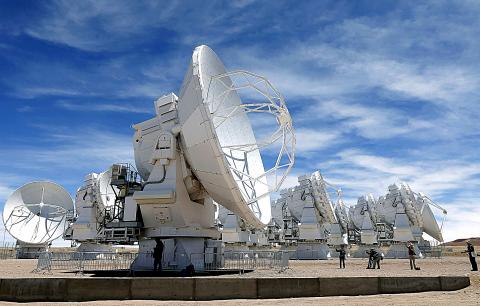The National Science Council (NSC) and Academia Sinica yesterday announced that an international astronomy project, the Atacama Large Millimeter Array (ALMA), an array of radio telescopes located in Chile, in which Taiwan has participated, was launched on Thursday.
The ALMA project is an international project including countries from Europe, North America and East Asia, in cooperation with Chile. The project has installed 66 high-precision antennas with 12m and 7m diameter radio telescopes, which are capable of observing at wavelengths of between 0.3mm and 9.6mm, on the Chajnantor Plateau 5,000m above sea level in northern Chile.
Wang Jye-ming (王杰明), research fellow and deputy director of Academia Sinica’s Institute of Astronomy and Astrophysics, said the high resolution and sensitivity of the array is expected to provide insights on planet formation, star births during the early universe or even the origin of life and the solar system.

Photo: EPA
“As an example, the power of the ALMA’s high resolution is like being able to use a telescope at Kenting (墾丁) in Pingtung County to observe a coin or a ladybug on the tip of Taipei 101,” Wang said, adding that the ALMA’s resolution is about 10 times that of the Hubble Space Telescope.
The Taiwanese research team’s contribution to the ALMA project is mainly on the East Asia Front-End Integration Center — integrating the front-end components into front-end assemblies and testing all the integrated front-end assemblies before they are delivered to Chile, as well as having built two Front-End Service Vehicles.
The ALMA project began calls for academic research project proposals in late 2011, and Taiwan’s research teams acquired 10 projects in the first year and 14 projects last year, Wang said.
NSC Minister Cyrus Chu (朱敬一) said that because Taiwan would cover about 5 percent of the project’s total cost until 2016, the approval rate of Taiwanese research teams’ proposals for academic research with the ALMA had been about 7 or 8 percent since 2011, showing international recognition of Taiwan’s research and execution abilities.

Taiwan is stepping up plans to create self-sufficient supply chains for combat drones and increase foreign orders from the US to counter China’s numerical superiority, a defense official said on Saturday. Commenting on condition of anonymity, the official said the nation’s armed forces are in agreement with US Admiral Samuel Paparo’s assessment that Taiwan’s military must be prepared to turn the nation’s waters into a “hellscape” for the Chinese People’s Liberation Army (PLA). Paparo, the commander of the US Indo-Pacific Command, reiterated the concept during a Congressional hearing in Washington on Wednesday. He first coined the term in a security conference last

Prosecutors today declined to say who was questioned regarding alleged forgery on petitions to recall Democratic Progressive Party (DPP) legislators, after Chinese-language media earlier reported that members of the Chinese Nationalist Party (KMT) Youth League were brought in for questioning. The Ministry of Justice Investigation Bureau confirmed that two people had been questioned, but did not disclose any further information about the ongoing investigation. KMT Youth League members Lee Hsiao-liang (李孝亮) and Liu Szu-yin (劉思吟) — who are leading the effort to recall DPP caucus chief executive Rosalia Wu (吳思瑤) and Legislator Wu Pei-yi (吳沛憶) — both posted on Facebook saying: “I

Sung Chien-liang (宋建樑), who led efforts to recall Democratic Progressive Party (DPP) Legislator Lee Kun-cheng (李坤城), was released on bail of NT$80,000 today amid outcry over his decision to wear a Nazi armband to questioning the night before. Sung arrived at the New Taipei District Prosecutors’ Office for questioning in a recall petition forgery case last night wearing a red armband bearing a swastika, carrying a copy of Adolf Hitler’s Mein Kampf and giving a Nazi salute. Sung left the building at 1:15am without the armband and covering the book with his coat. Lee said today that this is a serious

A court has approved Kaohsiung prosecutors’ request that two people working for Democratic Progressive Party (DPP) Legislator Lin Dai-hua (林岱樺) be detained, as a probe into two cases allegedly involving her continues. The request was made on Friday, after prosecutors raided Lin’s two offices and the staffers’ residences, and questioned five on suspicion of contravening the Anti-Corruption Act (貪汙治罪條例). The people included the directors of Lin’s Daliao (大寮) and Linyuan (林園) district offices in Kaohsiung, surnamed Chou (周) and Lin (林) respectively, as well as three other staffers. The prosecutors’ move came after they interrogated Lin Dai-hua on Wednesday. She appeared solemn following